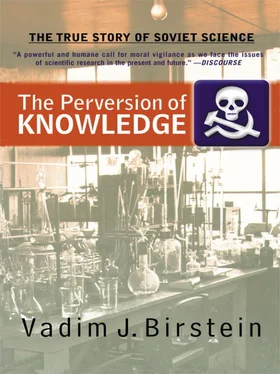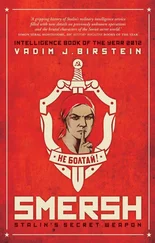25. Riehl, Nikolaus, and Frederick Seitz, Stalin’s Captive: Nikolaus Riehl and the Soviet Race for the Bomb (Washington, DC: American Chemical Society and Chemical Heritage Association, 1996).
26. “Osnovnye daty zhizni N. V. Timofeev-Ressovsky” [The main dates in the life of N. V. Timofeev-Ressovsky], in Timofeev-Ressovsky, Vospominaniya: Istorii, napisannye im samim (2000), pp. 819–822.
27. Heinrich Zeiss’ prisoner card in Vladimir Prison. Memorial’s Archive (Moscow), fond 171 (Document 21 in Appendix II).
28. Articles 58–6, pt.1, and 58–9. Zeiss’s prisoner card.
29. Mairanovsky’s report to Merkulov, mentioned in Bobryonev, “Doktor Smert,” p. 401; Bobryonev and Ryazentsev, The Ghosts, p. 181.
30. Statement by Dr. Leo Alexander, in Mitscherlich and Mielke, Doctors of Infamy , pp. 27–34.
31. Taylor, “Opening Statement of the Prosecution.”
32. Proctor, Robert N., Racial Hygiene: Medicine Under the Nazis (Cambridge: Harvard University Press, 1988), p. 221.
33. Cited in Posner, Gerald L., and John Ware, Mengele: The Complete Story (New York: Cooper Square Press, 2000), p. 42.
34. Bobryonev, “Doktor Smert,” p. 292; Bobryonev and Ryazentsev, The Ghosts, pp. 138–139.
35. The text of the letter is given in Bobryonev, “Doktor Smert,” pp. 294–296.
36. Bobryonev, “Doktor Smert,” pp. 346 and 374; Bobryonev and Ryazentsev, The Ghosts, pp. 159–160 and 183–184.
37. For details, see Stolyarov, Palachi i zhertvy ; Knight, Beria .
38. Knight, Beria , p. 158.
39. The report also contained other accusations of Abakumov: that he violated the MGB interrogation process by ordering not to write transcripts of interrogations and, therefore, concealed from Stalin and the Party facts of sabotage by the imperialistic forces, that after the war he acquired a lot of trophy stuff, and so on (Stolyarov, Palachi i zhertvy , pp. 13–15).
40. Naumov and Sigachev, Lavrentii Beria, pp. 496–497.
41. Some of them (Raikhman and Pitovranov) have already been mentioned above. But the most important persons were the head of the MGB Department for the Investigation of Especially Important Cases, Aleksandr Leonov, and his two deputies, Vladimir Komarov and Mikhail Likhachev, as well as the head of the MGB Secretariat, Ivan Chernov, and his deputy, Yakov Broverman. All these individuals, except Chernov, worked during the war in the Military Counterintelligence SMERSH under Abakumov, who headed SMERSH.
42. Petrov and Kasatkina, “Ekspertiza ‘Memoriala.’”
43. Before that, until February 1952, Abakumov was kept in a special prison of the Central Committee of the Communist Party, “Matrosskaya Tishina,” and his case was investigated by Deputy Chief Prosecutor K. Mokichev (Stolyarov, Palachi i zhertvy , pp. 15–37).
44. Solzhenitsyn, A. I., The Gulag Archipelago, 1918–1956, vol. 1 (New York: Harper and Row, 1973), pp. 126–127.
45. Mairanovsky’s letter to Khrushchev. The text of the letter is given in Bobryonev, “ Doktor Smert,” pp. 294–296.
46. Bobryonev, “Doktor Smert,” p. 290–291.
47. Larina, This I Cannot Forget , p. 241.
48. Vaksberg, Stalin Against the Jews , p. 101.
49. Larina, This I Cannot Forget , pp. 240–246.
50. Three names are known: Pavel Vasiliev, a poet; P. Petrovsky, the son of an old Bolshevik; and a military historian named P. Meshcheryakov (Parrish, Lesser Terror , p. 310). Arkady Vaksberg claims that Sverdlov “beat them [prisoners] mercilessly” during interrogations (Vaksberg, Stalin Against the Jews , pp. 101–102).
51. Larina, This I Cannot Forget , pp. 170 and 239–241.
52. Vaksberg, Stalin’s Prosecutor , p. 133.
53. Changes in subordination of the Secret-Political Department from 1934 till 1954 are given in Kokurin and Petrov, Lubyanka , p. 126.
54. Sudoplatov, P., et al ., Special Tasks , p. 348.
55. Kostyrchenko, Out of the Red Shadows , p. 126.
56. Stolyarov, Palachi i zhertvy, p. 338.
57. Ibid., p. 338.
58. Bobryonev and Ryazentsev, The Ghosts, p. 27.
59. Kokurin and Petrov, “MGB,” p. 111.
60. There are two cards for Mairanovsky in Vladimir Prison’s file: one written on March 6, 1953, by V. Danilova (secretary of the prison’s archive), and a second one, written on July 6, 1956, by I. Shchelanova (Documents 16 and 17 in Appendix II). The first card includes information from Mairanovsky’s arrival to the prison on March 5, 1953, until his departure for Lubyanka Prison in Moscow on June 7, 1953. The second card contains information from Mairanovsky’s return to Vladimir Prision on July 4, 1956, until his release on December 13, 1961.
61. Eitingon’s prisoner card (Document 18 in Appendix II).
62. Stolyarov, Palachi i zhertvy , pp. 338–339.
63. Zaretsky, Ye., “Vladimirskii Tsentral”: Istoriya stroitel’stva, znamenitye uzniki, den’ segodnyashnii (po muzeinoi ekspozitsii) [Vladimir Prison: History, Famous Prisoners, and Today (museum exposition)] (Vladimir: AOZT “Kaleidoskop,” 1997) (in Russian).
64. Sudoplatov, P., et al ., Special Tasks , pp. 101–102.
65. Wilhelm and Natalia Munters’s prisoner cards in Vladimir Prison (Memorial’s Archive [Moscow], fond 171; prisoner cards from Vladimir Prison).
66. See Volin, “S berievtsami vo Vladimirskoi Tuyr’me,” and Men’shagin, Vospominaniya .
67. Parvilahti, Unto, Beria’s Gardens (New York: E. P. Dutton, 1960), pp. 147–150.
68. Ipatieff, The Life of a Chemist , p. 441.
69. In his memoirs, Lucien Gouaze mentioned Clauberg as one of the inhabitants of Cell 45 in Corpus 3 in 1954 (Serbet, PolitIsolator , p. 368).
70. Proctor, Robert N., “Nazi Doctors, Racial Medicine, and Human Experimentation,” in Annas and Grodin, The Nazi Doctors , pp. 17–31.
71. Taylor, “Opening Statement of the Prosecution,” p. 80. See also Weinreich, Hitler’s Professors , pp. 197, 218; Lifton, The Nazi Doctors , pp. 271–278, and Lifton, R. J., and A. Hackett, “Nazi Doctors,” in Gutman, Israel, Michael Berenbaum, Yisrael Gutman, and Raul Hilberg, eds., Anatomy of the Auschwitz Death Camp (Bloomington: Indiana University Press and U.S. Holocaust Memorial Museum, 1994), pp. 301–316.
72. Men’shagin, Vospominaniya , p. 100; Menshagin’s prisoner card in Vladimir Prison.
73. From March 24, 1949, until July 21, 1949 (Sgovio’s prisoner card, Memorial’s Archive [Moscow], fond 171; prisoner cards from Vladimir Prison).
74. Sgovio, Thomas, Dear America! Why I Turned Against Communism (Kenmore, NY: Partners’ Press: 1979), p. 280.
75. Men’shagin, Vospominaniya , p. 100.
76. Parvilahti, Beria’s Gardens, p. 138; Men’shagin, Vospominaniya , p. 100.
77. Volin, “S berievtsami vo Vladimirskoi Tur’me.” O. Volin was the pseudonym of a former Soviet dissident and political prisoner, Revolt Pimenov (see Sakharov, Memoirs pp. 314–318).
78. Revolt Pimenov’s prisoner card in Vladimir Prison (Memorial’s Archive [Moscow], fond 171; prisoner cards from Vladimir Prison).
79. Jeffery, Inside Russia pp. 56–57.
80. Volin, “S berievtsami vo Vladimirskoi Tur’me.”
81. Jeffery, Inside Russia , p. 57.
82. A Decree of the Presidium of the USSR Supreme Council “On Amnesty” dated March 27, 1953, included paragraph 2, which amnestied this type of prisoners.
Читать дальше











